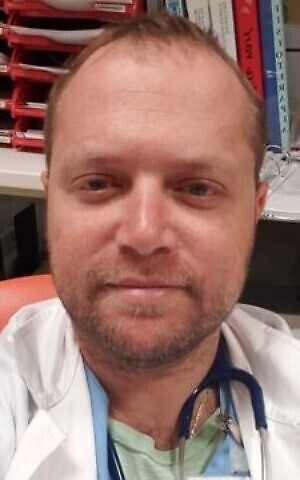
Carmi Sheffer describes connecting patients to ventilators via scuba gear, placing them on stomachs, in battle with unpredictable virus which ‘spreads like wildfire’ among elderly
By IRA TOLCHIN IMMERGLUCK The Times of Israel
An Israeli doctor in northern Italy says the country is close to “flattening the curve” with some new treatments appearing to be helping some COVID-19 patients, offering a rare glimmer of hope in the hard-hit epicenter of the global coronavirus pandemic.
Carmi Sheffer, a doctor at the University Hospital of Padua, told The Times of Israel’s Hebrew-language sister site, Zman Yisrael, that as recently as last week he had been pessimistic.
“We were in the height of the outbreak, emergency rooms filled up, and the condition of patients on respirators with danger to their lives simply didn’t improve. I felt despair,” said Sheffer.
“But in the past few days, people have begun to recover, in part due to new medications and also as a result of the fact that it takes some two weeks to recover from the virus,” he added.
The city of Padua has fared better than other nearby cities, with 1,552 confirmed COVID-19 patients, of whom 136 of them were hospitalized and 13 have died. Sheffer said the region of Veneto had more time to prepare for the outbreak than the neighboring hard-hit Lombardy.
He attributed the high death rates in Italy to the long life expectancy in the country and high percentage of elderly, as well as the spread within geriatric hospitals. “The moment the virus arrives in a place where an elderly population is concentrated, it spreads like wildfire,” he said.
In Padua, the autoimmune medicine Tocilizumab has proven effective, but can only be used once it is established that no other viruses or bacteria are present in the patients’ bodies, he said. The hospital where he works has also seen positive results from the antiviral drug Remdesivir, he added.
He said medics have been forced to be creative, giving an example from the city of Parma where patients who couldn’t be put on a respirator using a tube were attached to it using a snorkeling mask, with a part that connects it to the machine being printed in a 3D printer.
While at first, doctors viewed the new coronavirus as an extremely infectious flu, they have since learned that the disease is highly unpredictable and that patients’ conditions can change drastically several times during a day, while a medication can take hours to show an effect.
One technique he said had yielded dramatic results was to have patients lie on their stomach instead of on their back while on a ventilator. “Suddenly the oxygen level in the blood jumped by hundreds of percents,” he said.
“I think the worst is behind us. We will control the virus and flatten the curve within a few weeks, but the closure will continue until June,” he predicted. “Italy is ahead of Israel by something like a month, so in my opinion, [in Israel] it will end only in July.”
But he also predicted that Israel could see soaring death rates, like Italy.
“I do not think the Israeli healthcare system is prepared for an outbreak on this scale. Israel’s advantage is the army, which can build field hospitals to treat mild cases, which it should,” he said.
He said that he would want to return to Israel when the outbreak in Padua is over, to make further use of the knowledge he was gaining by the day.
“I feel like I’m learning more about respiratory illnesses now than during all the 16 years since I started studying medicine,” he said, likening the teamwork in the hospital to basic training in the Israel Defense Forces.
“We are soldiers in the biggest army in the world.”